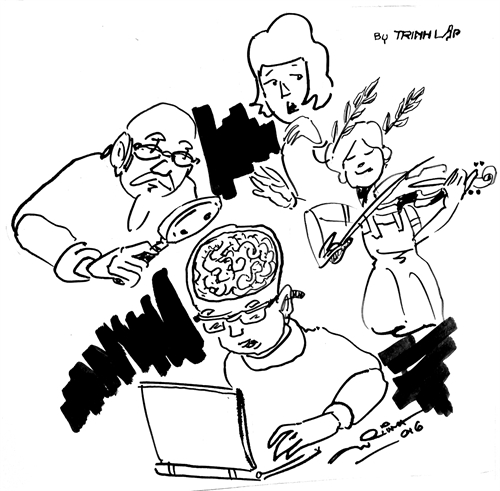 Talk Around Town
Talk Around Town

Last weekend, I had to have a two-hour talk with my friend, who is a young mother, about her 8-year-old child’s learning situation.
 |
by Mộc Miên
Last weekend, I had to have a two-hour talk with my friend, who is a young mother, about her 8-year-old child’s learning situation.
“He insists on quitting schooling and going for his martial arts class. He cried for several days, refusing to go to school and eating very little,” my friend Nguyễn Hồng Vân said.
“I used to think that learning martial arts would help him with strength and flexibility. I did not realise that it would cause such headaches,” she added.
On many online forums where adults share parenting and child-raising skills and other relevant consultancy programmes now, I can see quite a few such cases. The children tend to be serious about what they really want to follow despite their young age.
Quite similar is the case of Trần Thu Hà where her girl is able to perform quite well in both piano and drawing classes.
“So, access to other classes on survival and living skills, debating skill and ballet dance are also given to her,” Hà said.
In Việt Nam, there is a bias which has made its way into most parents’ mind. Which is that a person who fulfils schooling from primary to tertiary levels has always been considered to have more chances of becoming successful rather than those who do not. The parents include the 7x generation and those in the latter stage, who have more hopes and even opportunities to make comprehensive investment on their children instead of just bringing the children to school to learn how to write and read as before the war ended.
Incidentally, one needs to realise that there are two types of parents. There are those such as Vân, who can be easily worried or disappointed about their children resulting in fewer opportunities for the child to continue extra classes. Or, there are those like Hà, who can over-expect and put much pressure on her child to be successful and be perfect.
Relevant to this aspect, a theory by Howard Gadner of Multiple Intelligence should be mentioned. There are about eight abilities to be considered. These are intelligence: musical–rhythmic, visual–spatial, and verbal–linguistic, in addition to logical–mathematical, bodily–kinesthetic, interpersonal, intrapersonal, and naturalistic.
In this case, if the parents are sensitive, sensible and knowledgeable enough to detect and nurture the inborn special abilities in their children things can be easier on them.
“Every child is a genius. The acknowledgement of the behaviour considered an intelligence in a single child helps the parents and educators to make a wise investment instead of being unfocussed, wasting the child’s aptitude, or putting too much pressure,” Nguyễn Mai Hoa, an education management specialist, said.
Another case for me to consider was that a father received feedback about his son that he was slow, incommunicative, and non-progressive in a music class. The father, fortunately, seemed unworried about the situation, but silently cancelled the class and spent more time talking and discovering more about his child. Soon after withdrawing him from class, the son was brought to a drawing class where his aptitude for drawing showed he had the opportunity to blossom. He was rated as a genius and very committed.
“I let my son learn drawing and music because I just wanted him to develop as he is and can be. My family has no ambition of pushing him to anywhere he does not want to be,” Hoàng Hùng Thắng, the father, shared.
From Thắng’ case, it can be seen that the direction and interference of parents are necessary but the most decisive factor is the child’s aptitude for something. It drives the child to be capable, committed and successful in that area.
“It is so amazing that his academic results are not affected. My son is quite happy and we are satisfied with him,” Thắng said.
“I always keep discovering my son, accompanying him, and give him relative freedom to develop as he is. For me, it is the key to my son’s success and happiness,” Thắng added.
Nowadays, in big cities like Hà Nội, HCM City and Đà Nẵng, centres and schools for life skills and arts education are being developed, and promise a bright future for the services. It indicates a special care of parents and educators for the sound development of future generations. However, behind that ambition, whether parents are sympathetic, loving and knowledgeable enough to understand the children as they are, takes time to answer. -VNS




